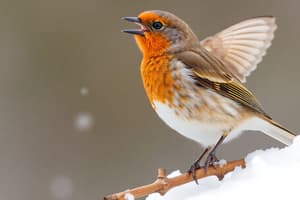Podcast
Questions and Answers
What is the act of observing and appreciating animals in their natural habitat known as?
What is the act of observing and appreciating animals in their natural habitat known as?
- Wildlife watching (correct)
- Habitat examination
- Animal tracking
- Nature exploration
How did the earliest human societies benefit from wildlife observation?
How did the earliest human societies benefit from wildlife observation?
- For entertainment purposes
- For spiritual rituals
- For food, clothing, and shelter (correct)
- For scientific research
What tools further enhanced our ability to observe animals in their natural habitats?
What tools further enhanced our ability to observe animals in their natural habitats?
- Photography and binoculars (correct)
- Cameras and telescopes
- GPS trackers and drones
- Compasses and maps
What does wildlife observation allow us to admire?
What does wildlife observation allow us to admire?
What does observing wildlife empower us to do?
What does observing wildlife empower us to do?
What is a key benefit of observing wildlife according to the text?
What is a key benefit of observing wildlife according to the text?
What is one benefit of spending time in nature and observing wildlife?
What is one benefit of spending time in nature and observing wildlife?
Which tip is essential for responsible wildlife observation?
Which tip is essential for responsible wildlife observation?
What method of wildlife observation focuses on spotting, identifying, and learning about birds?
What method of wildlife observation focuses on spotting, identifying, and learning about birds?
Why is it important to invest in quality binoculars, cameras, and gear for wildlife observation?
Why is it important to invest in quality binoculars, cameras, and gear for wildlife observation?
What does wildlife mapping involve?
What does wildlife mapping involve?
What is a key aspect of ethical wildlife observation?
What is a key aspect of ethical wildlife observation?
Flashcards are hidden until you start studying
Study Notes
Exploring the Thrill of Wildlife Observation
Wildlife observation, also known as wildlife watching or nature viewing, is the act of observing and appreciating animals in their natural habitat. It's a pastime that combines a deep connection with nature, a chance to learn about our planet's diverse creatures, and an exciting opportunity to capture stunning moments with our senses and cameras.
Origins of Wildlife Observation
Our fascination with observing wildlife dates back to the earliest human societies, who relied on animals for food, clothing, and shelter. Over time, this natural curiosity evolved into the pursuit of wildlife observation, which became a cherished hobby for many. The development of photography and binoculars further enhanced our ability to observe animals in their natural habitats.
Benefits of Wildlife Observation
- Appreciation of Nature and Wildlife: Wildlife observation allows us to enjoy the beauty, intricacy, and diversity of life on Earth. It gives us an opportunity to admire the behaviors, adaptations, and interactions of various species.
- Environmental Education and Awareness: When observing wildlife, we learn about the natural world and the complex relationships between species. This knowledge empowers us to make more informed decisions about conservation and sustainable living.
- Mental Health and Well-being: Spending time in nature and observing wildlife can reduce stress and anxiety, increase happiness, and improve overall mental health and well-being.
- Community and Social Engagement: Wildlife observation is often a shared experience. Joining wildlife-watching groups or attending nature events helps us connect with like-minded individuals and build a sense of community.
Essential Tips for Wildlife Observation
- Respect: Be mindful of the animals' needs and the environment around you. Avoid disturbing them and keep a safe distance.
- Patience: Wildlife observation requires patience and persistence. It may take some time to spot your desired species, so be patient and continue searching.
- Safety: Always follow safety guidelines and be aware of potential hazards, such as unfamiliar terrain, wild animals, or bad weather.
- Equipment: Investing in quality binoculars, cameras, and other gear can greatly enhance your wildlife observation experience.
- Accessibility: Many national parks, nature reserves, and wildlife refuges offer access to wildlife viewing areas and guided tours.
- Ethical Wildlife Observation: Ensure that your wildlife observation practices are responsible and respectful of nature. Always follow local regulations and guidelines.
Wildlife Observation Methods
- Birdwatching: This popular form of wildlife observation focuses on spotting, identifying, and learning about birds. It can be done with binoculars, scopes, or cameras.
- Wildlife Photography: Photographing wildlife allows us to capture memorable moments and share our experiences with others.
- Wildlife Tracking: By following animal tracks, droppings, and other signs, we can learn about their behaviors and movements.
- Wildlife Sound Recording: Using specialized equipment, we can record the sounds of wildlife and use them to identify and learn about various species.
- Wildlife Mapping: By documenting and recording wildlife sightings, we can create maps and databases to help monitor population trends and habitat changes.
Wildlife observation is a lifelong learning experience that helps us connect with the natural world and learn about the species that share our planet. By observing wildlife responsibly and ethically, we can better understand and protect the diverse ecosystems that support us all.
Studying That Suits You
Use AI to generate personalized quizzes and flashcards to suit your learning preferences.




